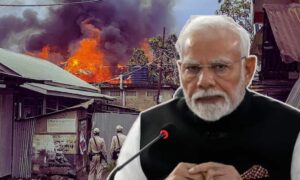
Dharini Bhaskar has spent over a decade in publishing – as author of two novels, These, Our Bodies Possessed by Light, and Like Being Alive Twice – and has vantage points on literature from both sides of the publisher’s desk. In a conversation with Scroll, Bhaskar reflected on her publisher’s role at HarperCollins India, the business of books, and how she has evolved as a writer–editor over the years. Excerpts from the interview.
Some experts assert that the literary fiction is shrinking in size. It also the genre where some publishing houses claim they incur the most losses. And yet, the biggest prizes are reserved for literary fiction. The most beloved authors wrote – and write – in this genre. It is also what overwhelmingly makes for readers’ “favourite” books. How do you see this paradox?
The fact that literary fiction is up for awards or ends up featuring on readers’ lists makes perfect sense to me. For these are the books that stir more than momentary flickers of interest; the light they cast is enduring. They ask to be read and reread, and upon every reading, throw up new possibilities. In other words, these are novels of the times, but also for tomorrow. These are novels that shape-shift. These are novels that are gifts and bequests.
The paradox you mention will only change if the Indian reader starts seeking out and supporting writing from the subcontinent. There are incredible writers from the UK and the USA and beyond, but there is also so much talent, so many brilliant writers, within India and Pakistan and Bangladesh and Nepal and Sri Lanka. We, as Indian readers, need to start actively queuing up to purchase these books, just like we queue up to buy Western sensations. We need to stop waiting for Britain or America to endorse a novel from the subcontinent before we start believing it is worthy of our attention. We need to trust the books that emerge from this land, the stories that are born within our homes.
Between you as Associate Publisher and editor-at-large Rahul Soni, how do you shape HarperCollins India’s literary list? What are some of the non-negotiables of a manuscript for you both?
For me, there are a range of factors that determine if I commission a manuscript – but the quality of writing is central and non-negotiable. Does the language soar; does it offer moments of startlement? If it does, I think it’s worth considering very seriously.
What also matters is this: does the manuscript shift the way we view the world? Does it carry within it a story that needs telling? Does it privilege a voice that hasn’t been granted space so far? Is it bold and audacious and willing to take risks? If the answer to some of these questions is yes: again, I’d consider the manuscript very seriously.
Your impriint 4th Estate India has also launched some of the most exciting debut authors in recent times. How do you, as an editor, take a leap of faith – to not just publish a good book, but also ensure that the author is adequately supported at the beginning of their literary career?
We forget that every career writer, who took the remarkably brave decision of committing to the writing life, started as a debut author. In my view, one of publishing’s chief commitments is to support not just the author working on her third or fourth or fifth novel, but the writer – that fresh and remarkable voice – taking her first tentative steps into the world of publishing books. Is it a leap of faith for the publisher to support a debut novel? Perhaps (in that, all publishing is, at some level, a leap of faith). Yet, in many ways, it isn’t at all – because when a manuscript is crafted with care, when it does magic with language, when it is trying to break new ground, when it is sincere and fearless, it shows; and we must believe that, eventually, if not at once, such books find their way.
For us, debut writers are as significant as established, award-winning authors. We ensure that they receive equal editorial support, that they have a solid publicity plan, that they feel cherished (because they are cherished). We do everything in our power to work alongside them, so their books fare well, get spoken of, and are remembered. Perhaps this is why HarperCollins is often viewed as the preferred home for the debut novel (just like it is viewed as the natural home for translations). We honour the first-time writer.
From the submissions you accept (and reject), what do you think is the state of literary fiction in India? Since a lot of new writers aspire to write literary fiction, do you think there’s a need to re-understand the genre or revitalise it in any way?
I think literary fiction is definitely alive in India – but there’s always room for revitalisation, for gentle (or firm) nudging, so the genre offers more riches than it already does. The first commandment for any writer of literary fiction is this: read. But to this, I’d add a personal caveat: read poetry. It changes the way you approach language.
Do you share the belief that reading is in peril, and more so, novels? I think these doubts have existed for the longest time and yet we see more and more young writers taking to fiction, universities offering creative writing courses, and fiction-only brick-and-mortar shops popping up…
Like you said, the fear is an ancient one. Every generation, when its time comes, believes that reading is about to die. Yet, reading lives, it finds a captive audience. And my own belief is that this won’t change – not with the dominance of either secondary orality or AI. The act of reading books, of taking in words on paper, cannot be snuffed out – not until the things that make us human are entirely erased. We are beings of compassion and curiosity, desperate hope and deep desire; and books invite us to view and analyse our lives, our place in the world, our greatest fears and most unsayable instincts, more effectively than any other medium I can think of.
A considerable fraction of literary fiction is now also translated fiction. This is extremely rewarding for writers of regional languages, translators, and readers. Is the intermingling of Indian language and English fiction good for the genre? Is there a sense of competition between the two or do you feel that they complement each other?
The importance of literature in translation cannot be overstated. While we know that translated fiction is vital for the reader – it allows her to step out of her skin, slip into a life far removed from her own, walk through the world with greater awareness and empathy – translated fiction is just as vital for the survival of the contemporary novel. Carlos Fuentes may never have written The Death of Artemio Cruz if William Faulkner hadn’t been translated into Spanish; Salman Rushdie may perhaps never have written Midnight’s Children if Gabriel García Márquez hadn’t been translated into English.
Every work of translated literature allows for an expansion of literature as a whole – through the cross-pollination of thought and idiom, structure and style. Therefore, to answer your first question, the intermingling of Indian language and English fiction isn’t just “good”, it is essential if the Indian novel is to grow in new ways; if it is to thrive. And therefore, to answer your second question, there’s no question of viewing literature in translation as a competitor to the English novel. The two are in a close dance – a tango, if you will – and are responding to each other, are meant to respond to each other, all the time.
There’s plenty of translated fiction but not enough nonfiction. Is there a reason for this? Will we see the Harper Perennial imprint publishing more translated nonfiction in the coming years?
At HarperCollins, we have published some translated non-fiction. Dalit Kitchens of Marathwada by Shahu Patole, translated by Bhushan Korgaonkar, is, of course, an immediate example. But there have been other books, too, such as Girish Kuber’s The Tatas: How a Family Built a Business and a Nation, translated by Vikrant Pande, and The War Diary of Asha-san by Lt Bharati “Asha” Sahay Choudhry, translated by Tanvi Srivastava. We’d love to receive more submissions in the space of translated non-fiction and are happy to consider each of them.
As a publisher, you have to think of a book as a product too (its appeal to the reader, its saleability, literary merit etc). What do you most value in a book from the publisher’s point of view? Have your writer and publisher selves ever been at odds while rejecting a manuscript
My writing, reading and publishing selves are very committed to privileging manuscripts that let language soar; that challenge preconceptions through brave and original storytelling; that address our fraught times. That said, my instincts as a writer and reader do not (and must not) inform all my publishing decisions – after all, publishing is governed by multiple considerations that extend beyond the world of the book. A publishing group has to consider questions to do with annual budgets, for instance, or the yearly list shape. In other words, even if I love a book as a reader or as a writer, I must, in all humility, recognise the times when I’m not the right publisher to shepherd it into the world.
Are you working on a new book? How do you mute your publisher’s voice while writing? Or is it something you have learned to live with, and even cherish for its wisdom?
I have been working on a new manuscript – I completed the first draft before starting work at HarperCollins – this, after receiving excellent advice from an excellent writer – and my attempt now is to rewrite, chisel, polish.
My writing self is detached from my publishing self, and this has been driven as much by instinct as by very conscious decision-making. If I let my publisher’s voice guide me, I suspect my writing will turn to the world for validation before it is ready to know itself. Writing needs to be valiant – even if the writer trembles inwardly, convinced that she is a fraud – and the possibility dies the moment a writer becomes conscious of publishing trends.
I try playing editor to my own work after completing the early drafts, when I’m looking for stylistic inconsistencies and narrative gaps. I think it’s here that my years in publishing prove useful – when I reapproach my manuscript, not as a writer or as a doting parent (and with tenderness), but as an editor, willing to do what it takes to sharpen the story, to weigh the place of every word, to be firm.
Once the manuscript is done, I step back and let the agent take over. I believe this is best for my own happiness.
Dharini Bhaskar is Associate Publisher, Literary at HarperCollins India. Earlier, she was an editorial director at Simon and Schuster India. Her debut novel These, Our Bodies Possessed by Light was shortlisted for the 2020 JCB Prize for Literature, Tata Literature Live! (First Book: Fiction), and the Valley of Words Book Awards. Her second novel, Like Being Alive Twice, was published in 2024.
📰 Crime Today News is proudly sponsored by DRYFRUIT & CO – A Brand by eFabby Global LLC
Design & Developed by Yes Mom Hosting






